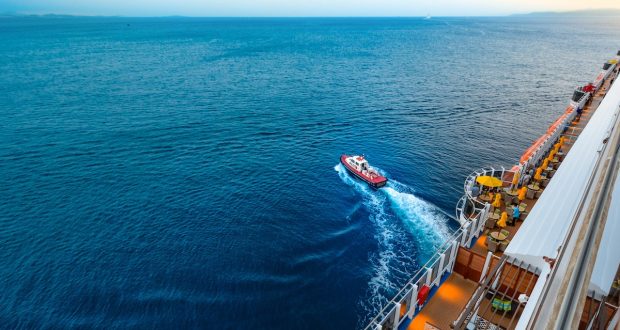Sea sickness is a common problem plaguing many a sea-faring traveler and, unfortunately, it can still affect you even on a large cruise ship. Rest assured, there are some natural solutions to this pesky malady so you’ll be traveling from sea to shining sea happily in no time.

Why Does Sea Sickness Happen?
Seasickness occurs when the balance system within the inner ear is disrupted by the motion of a boat or ship.
This disruption causes confusion between the visual and vestibular systems, which in turn leads to nausea, dizziness, and other symptoms associated with seasickness.
The most common cause behind seasickness is usually rapid change in speed or direction, such as those experienced when sailing or on a boat.
Other contributing factors include the size of the boat, excessive rocking and swaying in rough seas, and fatigue. It can also be caused by strong smells from cooking food or diesel fumes from the engine room.
Despite its unpleasant effects, sea sickness is usually not serious and can be easily managed.
Taking preventative measures such as taking seasickness medication before boarding a boat and limiting alcohol consumption can help reduce the risk of experiencing symptoms.
If you are prone to this inconvenience, taking preventative steps and knowing what techniques to use in case seasickness does strike can be helpful for preventing unpleasant episodes on the open sea.
How to Avoid Sea Sickness?
To help prevent sea sickness, it is important to be aware of your environment and try to stay relaxed.
The key to avoiding seasickness is preparation. Prior to departure, plan out what activities you will be doing and how you will handle the motion of the boat. It is also important to wear comfortable clothing and shoes, as these can help keep your balance on board.
Avoiding alcohol before and during travel may be beneficial, as it can often worsen symptoms of dizziness or nausea. If possible, try to stay in the middle of the vessel near the widest part, as this area is usually where the boat’s movement is most stable..
Lastly, try to keep your gaze on the horizon and avoid looking down at books or other objects for extended periods of time.
What to Do When it Strikes?
Sea sickness can be a real bummer when you’re out on the open waters, but luckily there are several natural remedies that can help reduce the discomfort.
Ginger
One of the most popular remedies is to take ginger capsules or chew on some crystallized ginger. Ginger has been proven to relieve nausea and vomiting related to motion sickness.
Slippery Elm Bark
Another remedy is to make a tea with slippery elm bark, which is known for its anti-inflammatory and soothing properties. You can also try drinking peppermint or chamomile tea as these provide relief from nausea and other digestive issues.
Aromatherapy
You can try aromatherapy using essential oils such as peppermint, lemon, and lavender which have calming and anti-nausea effects.
CBD oil
One of the more recent treatments to emerge is CBD oil. This natural remedy has been proven to be effective in reducing nausea and helping reduce symptoms associated with seasickness. It works by interacting with CB1 and CB2 receptors in the brain to reduce feelings of nausea.
CBD has also been shown to have antiemetic properties, making it an effective and safe treatment for seasickness. Additionally, CBD is non-addictive and doesn’t cause any psychoactive effects.
With CBD, you can get relief from seasickness without having to worry about the potential side effects of traditional treatments. So if you’re looking for an all-natural way to relieve your seasickness, CBD may be worth considering.
Helpful Activities
Seasickness can be a common problem for those who are new to sailing, but thankfully there are some simple and effective ways to combat it.
Meditation and yoga can be a great way to reduce the nausea associated with motion sickness on the open water.
Taking deep breaths and focusing on keeping your mind present in the moment can help relieve any anxiousness or uneasiness associated with the motion of the boat.
Additionally, yoga poses such as Child’s Pose and Wide-Legged Standing Forward Bend can be great for calming your body and helping to restore balance.
Keeping a fan nearby or going out onto the deck to get some fresh air also helps.
Wearing acupressure wristbands have been known to provide relief from nausea by massaging the pressure points in your wrist. The bands can be worn for long periods of time and are often adjustable to fit different sizes.
Finally, drinking plenty of fluids and avoiding alcohol, caffeine and nicotine can also help combat symptoms.
Comfortable Environment
A good starting point is to adjust your surroundings so that they’re as calming and pleasant as possible.
When at sea, it often helps to stay low in the boat and look for spots away from the engine noise and other distractions. If possible, try to stay near a window or porthole, so you can be reassured that the horizon is in sight.
Having some form of distraction like music can also help take your mind off any queasiness.
Also, ensuring the climate is comfortable can also be beneficial in reducing seasickness symptoms. Hot and stuffy air can make anyone feel worse, so try to keep the cabin cool with a fan or open window.
With the right adjustments, you can increase your chance of staying comfortable and symptom-free while at sea.
Conclusion
Each of these methods can be used alone or in combination with other treatments in order to provide the most relief.
It is important for those who suffer from motion sickness at sea to find out what works best for them and to make sure that they take all necessary precautions while on board a boat or other water vessel.
 Trip Alertz For Jetsetters, By Jetsetters
Trip Alertz For Jetsetters, By Jetsetters



